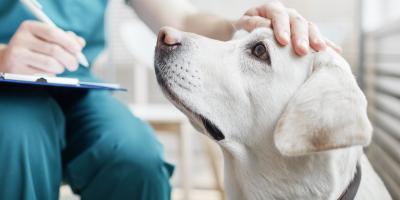How to Tell if Your Dog is Sick: Symptoms to Watch Out For


Just like us, dogs can also feel a little under the weather. The only difference is your pet can’t tell you when he’s feeling unwell. It’s important that you can recognize the symptoms of common dog illnesses so you can help your furry friend feel like himself again. Pay attention to the subtle signs your dog is sick, as pups can be good at hiding any aches or pains.
Checkups with your vet are the best way to spot any signs of possible illness as soon as possible. This is particularly important for older dogs that should have regular checkups every three-to-six months.
Here are some of the symptoms of health issues that may require veterinary care. Bear in mind that this list isn’t exhaustive, and you should always speak to your vet if you have any worries about your pet’s health.
General Lethargy, Depression, Listlessness and Sleeping More
If your dog isn’t his normal, enthusiastic, active self, it’s worth considering if it could be caused by something more serious than sleepiness. Generally, when dogs look sick or seem a lot more lethargic than normal (without any specific complaints), it is a common sign of a dog illness and warrants a visit with your vet.
Loss of Appetite or Complete Refusal to Eat
There are many completely harmless reasons why your dog might not want to eat as much as usual – hot weather, for example – but it can also indicate an underlying problem. It’s particularly important to consult your vet if your senior dog eats less than usual, or if their reduced appetite is accompanied by lethargy, vomiting, diarrhea, weight loss, or any other signs of illness.
Increase in Appetite
Most dogs enjoy their food and will happily chow down on anything offered to them, but a noticeable increase in appetite can also indicate conditions in dogs, such as diabetes or other hormonal problems, so speak to your vet if your dog is munching more than usual.
Weight Loss
If your dog starts losing weight for an unexplained reason, this can indicate an underlying illness, and he should be checked over by a vet. This is particularly important if your dog has other symptoms, such as a decrease or increase in appetite, vomiting, diarrhea, or lethargy.
Vomiting
Vomiting in dogs after eating spoiled food or raiding the trash isn’t unusual, but if the sickness is persistent, your dog vomits blood, they have trouble swallowing, or they’re gagging or retching, you should arrange an appointment with your vet as soon as you can. Vomiting can be a sign of many different illnesses, including intestinal problems, kidney disease, and liver disease. If you see your dog being sick and it is accompanied by lethargy, depression, diarrhea, or loss of appetite, it could indicate an underlying problem, so speak to your vet as soon as possible.
Diarrhea
Occasional diarrhea isn’t usually a cause for concern and might simply be the result of eating something unpleasant found outside. But if it’s persistent, or if the diarrhea is accompanied by vomiting, lethargy, loss of appetite or weight loss, or your dog’s poop is black in color or contain fresh blood or mucus, then visit your vet. Take a stool sample with you if you can.
Progressive Weight Gain
Your dog may end up with mobility issues if they put on too much weight, so watch out for signs of creeping obesity. You should be able to just about feel your dog’s ribs – assess your dog’s weight and then contact your vet for advice on managing the issue. If it seems that your dog’s tummy specifically has enlarged, it could simply be down to bloating, but might also indicate fluid within the abdomen or hormonal problems. If the swelling continues rapidly, however, contact your vet immediately, as this is a veterinary emergency and can be potentially fatal.
Excessive Thirst or Urination
Drinking more than usual or urinating more frequently can sometimes indicate diabetes or kidney problems. If you notice the water bowl is often empty and your dog takes a long time to urinate, or urinates more frequently than normal, contact your vet.
Difficulty Urinating
Your dog should never strain to urinate. Also, if they squat or cock their leg without producing urine, they produce only a small amount, or the urine is tinged with blood, you should call your vet.
Difficulty Defecating
Just like problems with urination, if you notice your dog straining to poop or they’ve not pooped for several days, then arrange a checkup with your vet. You should also keep an eye on your dog’s stools and watch out for any changes in color or consistency.
Change in Behavior
Your dog can’t tell you if something is wrong, but you can pick up clues from their behavior. If they become withdrawn and less interactive with the family, this could indicate a problem. Equally, if your normally friendly dog resents being picked up or shows any other odd behavior (twitching or aggression, for example), consult your vet. Treat seizures as a veterinary emergency. Get your dog to the vet as soon as possible (contact your vet for advice on the best method of transporting a dog experiencing a seizure). If any odd behavior is intermittent, it can be helpful to video an episode to show your vet.
Skin Complaints – Hair Loss, Itching and Redness
Your dog’s skin condition is a good indication of their health, and it should be smooth, pink, or black (depending on their pigmentation) with smooth, shiny hair. If your dog scratches excessively, pulls at his fur, or has scabbing, redness, or inflammation, there may be something amiss. A poor hair coat with any dandruff or dullness can also indicate an underlying illness in your dog. Any brownish discharge or redness in the ears, or head shaking, should also be investigated by your vet.
Red or Swollen Gums
Red or swollen gums and plaque (brown material) on the teeth, particularly when accompanied with bad breath, are all indications of oral disease. Affected dogs may also have a reduced appetite, weight loss, eat on only one side of their mouth or drop food while eating. This can be very painful and result in tooth loss, so consult your vet as soon as you notice any symptoms.
Rapid or Difficult Breathing and Coughing
If you notice your dog panting excessively, gasping, breathing very quickly, coughing, or making noises when they breathe, contact your vet as soon as possible. These symptoms may indicate a problem with their chest or be symptoms of a common condition, such as kennel cough.
Runny Eyes or Nose
Sneezing, runny eyes, and a runny nose might suggest there’s an illness affecting your dog’s upper respiratory tract. Equally, persistent, mucus-like discharge, bleeding from the nose, or a change in color of the nasal planum (the normally black area at the end of the nose) can suggest a health problem. If your dog’s eyes look sore or they’re blinking excessively with redness around the eyes, arrange an appointment with your vet.
Lameness/Stiffness
Although some slight stiffness can be a natural part of getting older, you should contact your vet if your dog is limping, is slow getting up or lying down, or has trouble going up and down the stairs. These symptoms could suggest that they might have a bone or joint issue, which your vet can help to confirm.
If you notice any other signs of illness in your dog or have any concerns about their health, contact your vet for further advice.
For more expert tips on your dog’s health, explore our other dog health symptoms and issues articles.
Related articles

Reward Yourself with myPurina
Earn and redeem rewards for Purina products with the myPurina app.






